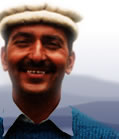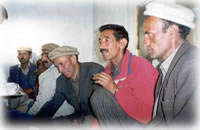 |
 |
||
 |
|||
|
RELATED THEMES environment environmental knowledge politics spiritual beliefs OTHER LOCAL THEMES BACKGROUND |
social institutions
For a relatively small community, Shimshal is home to a large number of social institutions including an arbitration committee; an education committee; the male and female volunteers; the scouts; and the community-based organisation the Shimshal Nature Trust (SNT). As an Ismaili community it is the Ismaili-based institutions which are the most talked about and perhaps the most significant. These are the village council, the Tariqa (religious education) board, the volunteers (male and female) and the scouts. All of these have rotational leadership positions, as do those connected with the Jamat Khana (religious and community centre). The community institutions have been run by men to date, but there is a recent mandate to ensure women are represented in all institutions. One female teacher (Pakistan 19) comments: "…now they have appointed female members in the Local Council, Tariqa board, in the Arbitration Committee and other Imamat Institutions… and women are also given preference in government jobs within the village. And it is the need of the time that women should work along with their male counterparts, that females should share their education, ideas and views, because collective participation of both male and female is beneficial for the society." She herself is involved in three different village institutions. Although some of the institutions existed before 1974 they became more significant after the abolition of the Mir's regime, and together with the Aga Khan Rural Support Programme's village and women's organisations, they are considered by some to have filled the institutional gap created by the loss of the Mir's political system. One narrator (Pakistan 35) believes that the "formal" Ismaili institutions that exist in the community today build on indigenous "informal" institutions that were equally important to life in Shimshal in the past. He explains: "For example, on the occasion of a journey… no one was assigned a specific task but a system based on age was developed which needed no formal institution or training… it was transferred from generation to generation…every individual would know his responsibilities with regard to his age group. The same concept is practiced today but in a more formal way. We now have the institutions of boy scouts, female and male volunteers, girl guides and social welfare institutions, working under formal command. Everyone knows at a certain age which institution they have to choose for community service and everyone knows about their duties…" Most narrators talk about village institutions favourably and both male and female narrators recount their experiences of involvement in them as members and leaders. There is certainly a pride and prestige associated with these positions. For example, one narrator explains: "I would join colleagues in all the community works… In recognition of those services I was appointed as a member of Tariqa board and in 1987 I became a member of the local council and that was a great opportunity for me…when I retired from the council I was nominated as kamdia (second highest local religious leader after mukhi) of central Jamat Khana Shimshal, in 1999, hence getting the great opportunity to serve the community" (Pakistan 8). Only one narrator (Pakistan 11) appears critical of these institutions, suggesting their religious influence dominates the indigenous systems and institutions of Shimshal. A few narrators discuss the arbitration committee, claiming it efficiently and effectively solves disputes within the community. One explains, "In my view our arbitration board is the best. They mediate in accordance with the principles of our ancestors but if we approach the government (court) every one would suffer…" (Pakistan 5). Most disputes are about land, and crime isn't seen as being a major issue although some express concerns that the road will bring in more outsiders, and so reduce security within the village. The Shimshal Nature Trust (SNT) is a relatively new community-based organisation and Panos' partner in the oral testimony project. Khaliq (Pakistan 1), a head teacher and member of SNT's task force, explains its mission: "SNT is not to replace any organisations but to support them." The governance structure of SNT is based on Shimshal's clan system: its board of directors consists of one individual from each of Shimshal's 21 skuins. quotes about social institutions"[In olden times when there was a dispute]… All the people would gather in the charaman (threshing ground) of your maternal uncle and the issues were discussed among them and decisions were jointly taken… The procedure of arbitration is more ordered and impartial today. It takes place confidentially under the institution whereas in ancient times people would favour each other and would further exaggerate the dispute, and the judgements were sometimes quite unfair." "I think one would be unlucky to go to the court because we have our own institution of justice and arbitration where the disputes are resolved and mediations are made free of cost. In the government's courts of law people spoil their resources (money) and life as the decisions take several years and there is no brotherhood between the parties… Our Maula (literally master; the Aga Khan) has established institutions for us and we should approach these institutions for speedy and cheap justice instead of going to the courts of law." "Well the happiest memory as far as I remember it is initiating scouting here because that was a time when I had no other responsibilities… I was about 15, 16 at that time and there was not any responsibility except working for scouting… One thing, doing even one thing good in a day was our motto, and helping the people who needed help. And we did a lot of work in the community and people appreciated us. And we were young and we felt proud of these things… for example one person was sick and his field was ready for harvest and there was no one to help him so we harvested the crops." "I will tell you about the volunteers, it is an old institution and we have also served the community through this institution. At that time it was not registered. But we have served the community beyond imagination… There were some major problems of the community in recent years, the bridge at Waeen Ben, which was constructed by boy scouts out of their own resources… On the route to Pamir there was a bridge it was constructed several times but always washed away by flood, this year it was finally constructed by the volunteers, they transported the iron rope from Dut and constructed the bridge in an extremely cold month of the winter season. Today we comfortably travel through these bridges; these are the activities of scouts and volunteers that mitigate our hardships." The female volunteers were more active in previous times than today… The volunteers provided quilts, pillows and woollen mats in these campsites [along the trek between Shimshal and the KKH]. These facilities were provided by our mothers (female volunteers), but today the volunteers are not as active as our mother mothers were. With the new things coming in, people felt they needed dynamic institutions; they couldn't be restricted to a numberdar… That is where SNT (the Shimshal Nature Trust) came in, with a broader futuristic vision for the community. It gave the community a forum to think about their own perspective on any new issue. It is more like people taking control of their own lives. So I hope that SNT should remain a dynamic institution building on the indigenous resources and rational adjustments. I hope it should remain dynamic. It should keep changing but keep the local values as core to build on. |
|
 The oldest established institutions in Shimshal are the three clan groups: Boqi Kathor, Ghazi Khathor and Bakhti Kathor. In former times each clan group would collectively manage funerals, marriages and key agricultural tasks. As the population of Shimshal has increased, the smaller skuins (sub-clans) have replaced these clans as the wider family group which come together on these occasions.
The oldest established institutions in Shimshal are the three clan groups: Boqi Kathor, Ghazi Khathor and Bakhti Kathor. In former times each clan group would collectively manage funerals, marriages and key agricultural tasks. As the population of Shimshal has increased, the smaller skuins (sub-clans) have replaced these clans as the wider family group which come together on these occasions.